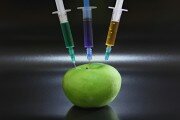BPA: Chemical Found In Plastic Worsens Migraines
Bisphenol A or BPA (a synthetic oestrogen) is a chemical used to harden plastics and it is one of the world’s most widely manufactured chemicals, with more than 2.2 million tons made each year.
We’ve written about this dangerous chemical on numerous occasions in the past. While the UK, European Union and the US have banned BPA in products like baby bottles, it is still likely that you have BPA in your system since 90 per cent of Europeans and Americans have detectable amounts.
Previous studies have shown that high levels of Bisphenol A can affect fertility by lowering sperm count by as much as 23 per cent and also increase the risk of DNA damage by 10 per cent.
Now it looks like there’s a new reason to introduce your own BPA ban.
It’s a real headache
US researchers recently uncovered a link between migraines and exposure to Bisphenol A, which notoriously can cause hormone imbalances.
As we’ve often seen, messing with hormones is a recipe for disaster. It increases your risk of heart disease and type 2 diabetes, prostate, breast, and thyroid cancers, cognitive problems and birth defects – the list goes on.
The researchers designed a rat study because, believe it or not, rats get migraine headaches. They respond to a migraine the same way we humans do: They lie still and avoid light and loud noises.
When researchers exposed the animals to BPA, migraine symptoms were consistently worse compared to rats with no exposure. So the researchers believe that simple reduction of BPA exposure could decrease the severity and frequency of migraines for humans too.
Fortunately, the growing awareness of BPA dangers makes it easier than ever to avoid this toxin chemical. The Mayo Clinic offers these four steps that can significantly reduce your BPA exposure…
1) Look for BPA-free containers and products.
2) Avoid canned foods. Most cans are lined with Bisphenol A.
3) Heat prompts its release and increases the risk of absorption. So don’t microwave food in plastic containers. Don’t clean plastic containers in a hot dishwasher.
4) Whenever possible, use glass, porcelain, or stainless steel containers – especially for hot foods and beverages.
So, if you haven’t thought about your New Year’s resolution yet, why not opt to avoid BPA as much as possible… especially since another BPA report recently stated that the use of BPA products will boom over the next five years. So having a plan to avoid it will be even more important in the future.
Did you find this information useful?
Then why not get more expert health recommendations just like this delivered direct to your inbox?
"It is truly refreshing to read a newsletter on the topic of alternative medicine which is scientifically based and reviewed by professionals..." - Robert Sinott
We respect your privacy and will never share your details with anyone else.Disclaimer: Bear in mind the material contained in this article is provided for information purposes only. We are not addressing anyone’s personal situation. Please consult with your own physician before acting on any recommendations contained herein.
Sources:
“Chemical commonly found in plastics makes migraines worse, researchers show” C.J. Janovy, University of Kansas Medical Center, 11/12/13, kumc.edu
“What is BPA, and what are the concerns about BPA?” Katherine Zeratsky, R.D., L.D., Mayo Clinic, mayoclinic.com
“Postmarketing Studies Lag After FDA Approvals” Larry Hand, Medscape Medical News, 10/28/13, medscape.com










